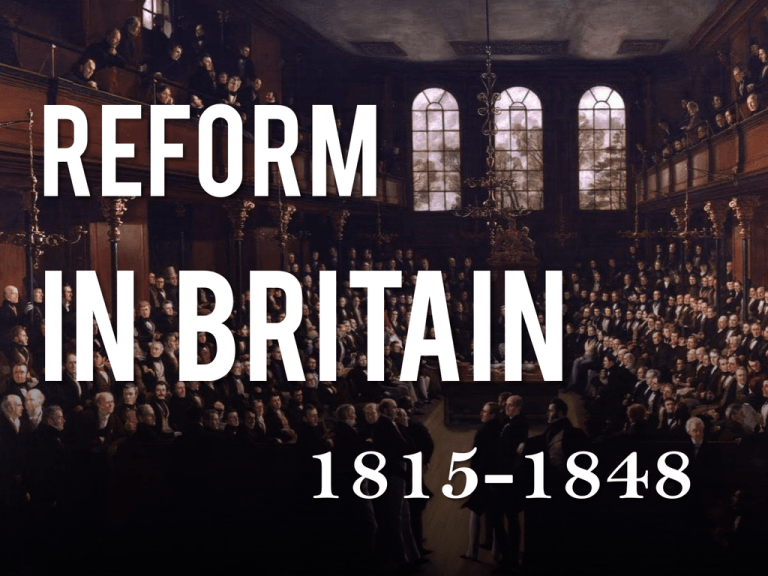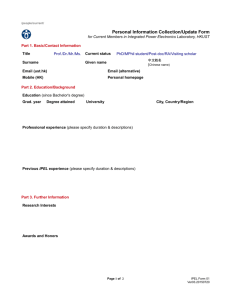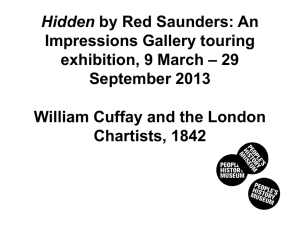Reform in Britain (1815-1848)
advertisement

REFORM IN BRITAIN 1815-1848 Karl Marx believed that England was ripe for a proletarian revolution. PARLIAMENT House of LORDS House of COMMONS Hereditary Nobility & Church Leaders “Elected” (LIMITED Suffrage) http://en.wikipedia.org/wiki/Houses_of_Parliament_series_(Monet) PROPERTY REQUIREMENTS TO VOTE & HOLD OFFICE Photo by stu_spivack House of Commons Dominated by LANDOWNERS ROTTEN BOROUGHS Photo by Donald Lee Pardue bor·ough ˈbərō A district, town, or administrative unit Photo by Donald Lee Pardue 1912 Presidential Election Which states had the most electoral votes in 1912? 2012 Presidential Election Where had the U.S. population shifted by 2012? Parliamentary districts did not reflect the population shifts caused by the Industrial Revolution. POLITICAL PARTIES TORIES WHIGS (Conservatives) (Liberals) Landed Gentry Businessmen http://en.wikipedia.org/wiki/Houses_of_Parliament_series_(Monet) Rotten Boroughs allowed the Tories to control Parliament. http://en.wikipedia.org/wiki/Houses_of_Parliament_series_(Monet) Photo by epSos .de Corn Laws (1815) Protective Tariff on foreign wheat “Corn” PRICES “Corn” The Corn Laws enriched the landed gentry at the expense of everyone else. Photo by Andrew Wilkinson of adult males could vote before 1832. Photo by stu_spivack I really need to VOTE! http://www.britishmuseum.org Redistricting to reflect population shifts Rotten Boroughs Suffrage for the urban middle class (lowered property requirements) of adult males could vote after the 1832 Act. Photo by stu_spivack STILL COULD NOT Photo by stu_spivack NO SUFFRAGE for the WORKING CLASS CONSERVATIVE LEADERS Resisted Working Class Agitation. 1819 “Peterloo” MASSACRE The cavalry charged into a working class protest, killing 15 and injuring hundreds. CHARTISTS 1838-1850 Working class activists who supported the People’s Charter SIX POINTS of CHARTISm 1. UNIVERSAL MALE SUFFRAGE 2. EQUAL-SIZED electoral districts 3. Voting by SECRET BALLOT 4. NO PROPERTY QUALIFICATION 5. PAY for members of Parliament 6. ANNUAL ELECTIONS of Parliament DEMOCRATIC REFORM SIX POINTS of CHARTISm 1. UNIVERSAL MALE SUFFRAGE 2. EQUAL-SIZED electoral districts 3. Voting by SECRET BALLOT 4. NO PROPERTY QUALIFICATION 5. PAY for members of Parliament 6. ANNUAL ELECTIONS of Parliament 1.3 million Signatures on the 1839 People’s Charter Photo by Ian Stannard The House of Commons did not accept the petition. DEMONSTRATIONS 1838-1848 Chartist Mural in Newport 1978-2013 Photo by Robin Drayton Photo Source: South Wales Chartist Network Photo Source: South Wales Chartist Network Photo Source: South Wales Chartist Network Photo Source: South Wales Chartist Network Photo Source: South Wales Chartist Network Photo Source: South Wales Chartist Network GREAT CHARTIST MEETING (1848) Chartists Attendance estimates: Chartists: 300,000 Government: 15,000 Sun. Observer 50,000 SIX POINTS of CHARTISm 1. UNIVERSAL MALE SUFFRAGE 2. EQUAL-SIZED electoral districts 3. Voting by SECRET BALLOT 4. NO PROPERTY QUALIFICATION 5. PAY for members of Parliament 6. ANNUAL ELECTIONS of Parliament Short term NOT ACTED UPON LONG term All but annual elections eventually took effect. TRADE Both liberals and radicals opposed the Corn Laws. Radical LIBERAL Opposition Opposition Lower Grain Prices Cheaper Food Pay Workers Less IRISH POTATO FAMINE 1845-1852 IRISH POTATO FAMINE 1845-1852 HOW can Parliament keep the price of “corn” artificially high when people are STARVING? Sir Robert PEEL Peel’s administration “re-peeled” the Corn Laws (get it?). REFORM FROM above RADICAL AGITATION Reform measures Passed by Parliament in lieu of Chartist proposals MINES ACT 1842 CORN LAWS REPEALED 1846 TEN HOUR ACT 1847 ENGELS TO BRITISH WORKERS “In order to divert you from the People’s Charter, the only goal important to you, they spawn all sorts of projects for superficial reforms.” -- Friedrich Engels, Marxist Reform > Revolution Parliament’s willingness to pass modest reforms saved Britain from the revolutionary upheavals that happened on the continent. Photo by William Warby Photo by Rebecca Partington Photo by William Warby HMPH



